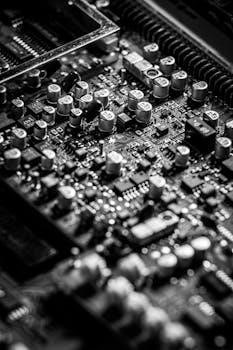
Technical Communication⁚ Definition and Scope
Technical communication is the process of translating complex information into an understandable format. It includes various forms of communication about technical topics. It’s used to convey scientific‚ engineering‚ or other technical information. The goal is to deliver factual information for user comprehension. It’s about making and sharing ideas in the workplace;
What is Technical Communication?
Technical communication is a discipline focused on conveying complex‚ specialized information in a clear and accessible way. It involves translating intricate details into user-friendly content‚ ensuring that the intended audience can easily understand and utilize the information. It’s a transactional process‚ facilitating a purposeful exchange between the sender and receiver for practical purposes such as informing‚ instructing‚ or persuading. This form of communication is geared toward the specific needs of a target audience‚ often in fields like science‚ engineering‚ and technology. It encompasses various forms‚ modes‚ and genres‚ from manuals and reports to user guides and websites. Technical communication is characterized by its structured approach and the use of precise terminology. It is not merely about writing; it also involves researching and creating information about technical processes or products. It requires a user-centered approach‚ providing the right information in the right format for effective comprehension.
Core Elements of Technical Communication
The core elements of technical communication revolve around clarity‚ accuracy‚ and user-centeredness. Clarity is paramount‚ ensuring that complex information is presented in a straightforward manner‚ easily understood by the target audience. Accuracy is equally crucial‚ as technical communication often deals with precise and critical information‚ requiring meticulous attention to detail and correct terminology. A user-centered approach is fundamental‚ prioritizing the needs and understanding of the intended audience. This involves tailoring the content to their level of knowledge and expertise. Effective technical communication also encompasses a structured approach‚ often employing specific formats and conventions to ensure consistency and ease of navigation. Furthermore‚ it involves the use of appropriate language that is clear‚ concise‚ and free from jargon where necessary. The ability to analyze product details‚ empathize with user needs‚ and provide solutions in understandable material is also essential. Finally‚ it is a purposeful activity‚ aimed at facilitating the safe and efficient use of products and processes.

Key Aspects of Technical Communication
Key aspects include clarity‚ precision‚ and a user-centered approach. It involves delivering factual information for safe and efficient use. Technical communication requires a structured approach using specific terminology. It aims for effective comprehension by the intended audience. It is goal-driven and contextual.
Clarity and Precision in Technical Writing
Clarity and precision are paramount in technical writing. The primary aim is to convey information without ambiguity‚ ensuring the reader understands the content accurately. This involves using precise language‚ avoiding jargon where possible‚ and defining technical terms when necessary. The writing should be direct‚ concise‚ and free from unnecessary complexity. Sentence structures should be clear and easy to follow. Each piece of information should be presented logically‚ building upon previous points. Accuracy is crucial‚ as any errors could lead to misinterpretations or incorrect actions. Technical writers must ensure that all facts‚ figures‚ and data are correct. This includes meticulous proofreading and editing. Proper formatting‚ use of headings‚ subheadings‚ bullet points‚ and visuals aid in enhancing clarity. The goal is to make complex information easily digestible by the intended audience‚ enabling them to use the information effectively and safely. Furthermore‚ adherence to established conventions and standards contributes to the overall clarity and professionalism of the document. In essence‚ clarity and precision form the foundation of effective technical communication.
User-Centered Approach in Information Delivery
A user-centered approach is fundamental in technical communication. It emphasizes understanding the audience’s needs‚ knowledge‚ and context. Information is tailored to be accessible and relevant to the specific users. This involves considering their technical expertise‚ goals‚ and potential challenges. The focus is on providing information that enables users to accomplish their tasks efficiently and effectively. User-centered design includes testing and gathering feedback to refine the information delivery. The format‚ style‚ and language used should align with user preferences and expectations. This approach ensures that the information is not only accurate but also usable. Technical communicators consider the user’s perspective at every stage‚ from planning to delivery. A user-centered approach prioritizes usability‚ ensuring that the information is easy to navigate‚ understand‚ and apply. Ultimately‚ the goal is to empower users with the knowledge they need‚ presented in a way that meets their specific requirements and enhances their experience. By prioritizing the user‚ technical communication becomes more effective and impactful.

Technical Communication in Practice
Technical communication involves creating information products for the efficient use of products. It includes various forms‚ modes and genres. It aims to convey usable information through writing or speech. It is also a method of researching and creating information about technical processes.

Types of Technical Documents and Materials
Technical communication encompasses a wide array of documents and materials designed to convey complex information effectively. These include user manuals‚ which provide instructions on how to operate products or systems. Technical reports present findings of research or investigations‚ while white papers offer in-depth analysis of specific issues. Installation guides detail the steps to set up equipment or software. API documentation explains how software components interact. Online help systems and FAQs provide immediate assistance to users. Training materials are created to educate users on various topics. Furthermore‚ we see proposals that outline plans for projects‚ and specifications that define product requirements. Datasheets present specific technical data‚ and business letters and memos are used for internal communication. Websites‚ social media content‚ and various other forms of digital content also play a big role. These materials are often essential for the safe‚ efficient‚ and effective use of technology and products.
Technical Writing vs; Other Forms of Writing
Technical writing differs significantly from other forms of writing like academic or journalistic writing. Unlike academic writing‚ which often focuses on theoretical concepts and analysis‚ technical writing centers on practical application and clear instructions. Journalistic writing prioritizes storytelling and current events‚ while technical writing emphasizes accuracy and precise language. Technical writing is transactional‚ providing specific information for practical purposes. It requires a definite purpose‚ strict format‚ and appropriate language‚ unlike creative writing which prioritizes expression. The focus is on clarity‚ conciseness‚ and usability‚ ensuring that the intended audience can easily understand and use the information provided. Technical documents aim to inform‚ instruct‚ or persuade a specific audience towards accomplishing a task. This is different from other writing forms that might aim for entertainment‚ personal reflection‚ or general knowledge dissemination. In essence‚ technical writing is user-centered‚ prioritizing effectiveness and clarity.

The Role of a Technical Communicator
Technical communicators are interpreters who analyze product details and user needs. They create understandable materials and convey complex information. They bridge the gap between technical experts and end-users. This involves various skills and competencies within the field of technical communication.
Skills and Competencies of Technical Communicators
Technical communicators require a diverse skill set to effectively convey complex information. Strong writing and editing skills are paramount‚ ensuring clarity and precision in all documentation. They must be adept at simplifying technical jargon into user-friendly language. Excellent research abilities are crucial for gathering accurate information. Furthermore‚ technical communicators need to understand various communication styles and adapt their approach to different audiences. They should possess strong analytical skills to grasp intricate technical concepts.
Proficiency in using various software tools‚ including word processors‚ layout programs‚ and content management systems‚ is also essential. Visual communication skills‚ including the ability to create informative graphics and illustrations‚ are beneficial. Time management and project management skills are vital for meeting deadlines and managing multiple projects. The ability to collaborate effectively with subject matter experts is also crucial. Furthermore‚ a user-centered approach is necessary‚ focusing on the needs of the audience and ensuring that information is accessible and easy to understand. Finally‚ adaptability and a willingness to learn new technologies and skills are essential for staying relevant in the field.
Technical Communication as a Career Path
Technical communication presents a viable and rewarding career path for individuals with strong communication skills and a knack for understanding complex topics. This field offers diverse opportunities across various industries‚ including technology‚ healthcare‚ engineering‚ and finance. Technical communicators find employment in roles such as technical writers‚ documentation specialists‚ instructional designers‚ and information architects. The demand for skilled technical communicators is consistently growing‚ reflecting the increasing need for clear and concise communication in today’s fast-paced world.
A career in technical communication provides a blend of creativity and technical expertise. It also provides the chance to make a tangible impact by ensuring that users can effectively utilize products and services. The field is suitable for those with liberal arts backgrounds‚ offering an opportunity to apply their writing and analytical skills in a practical context. Moreover‚ technical roles are also popular for technical experts who possess strong communication skills. Advancement opportunities exist for those who continue to develop their skills and knowledge‚ leading to positions such as team leads and content strategists.